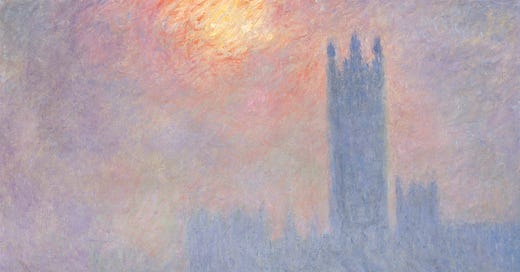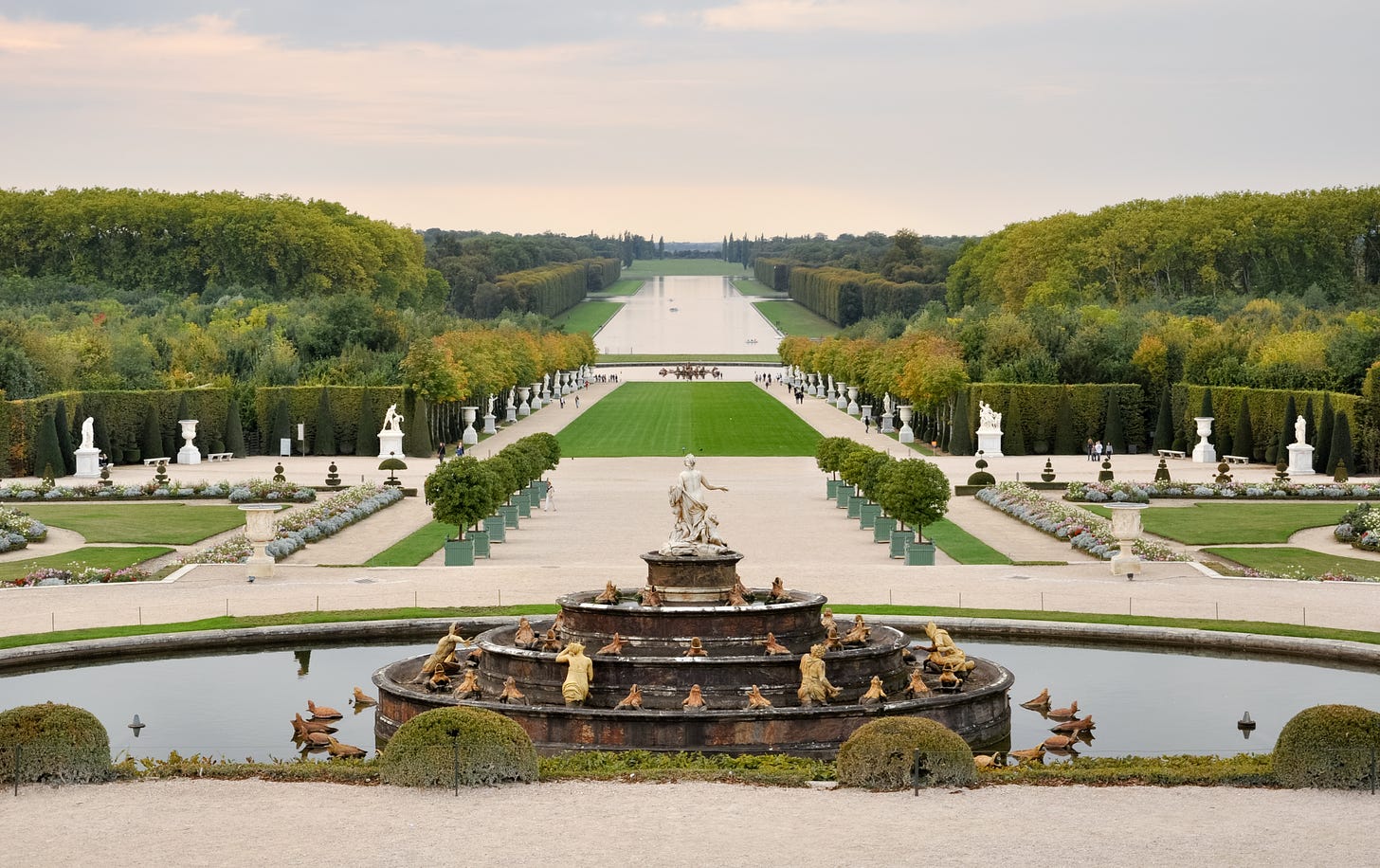Feel, then Create
How I came to understand what role Dionysos and Apollo play in creativity.
“My rational mind is clipping my wings,” I muttered hoarsely, waking up from the same dream I’d had for years. In it, I would fly thanks to my breath, rising with each inhale, but inevitably, as I became aware of it, I’d fall down.
I was shocked as I just deciphered the message this dream had been whispering all my life.
You see, since boyhood, I’ve always marveled at how some artists seem to capture beauty. Secretly, I desired to do the same someday. But fear clutched me. I didn’t dare to create until I knew precisely what it was I sought to express. So I studied the act of creation, seeking meaning in the abstract, rather than surrendering to the act itself.
And now this dream was telling me I had it all wrong. That I couldn’t expect to fly if I remained a spectator, forever on the outside looking in. That my rational mind was preventing me from experiencing the very thing I wanted to express.
This led me to reevaluate how I approached creation, and beauty, all my life.
March for the Ceremony, Lully
My first encounter with beauty dates back to when I was four or five. Each vacation morning, I'd wait for my grandmother to wake up. It was always the same ritual: she'd open her eyes with a smile, I'd leap into bed for a cuddle. She'd put on her yellow cotton robe. We would then savor our chocolate on the blue sofa, gazing out at the forest. A cheerful light filtered in through the branches of a fir tree, where squirrels darted around playfully. I melted into the sofa, wrapped in the endless comfort of a moment that still lingers in my heart.
We would then spend the day at the Chateau de Versailles, where my Grandmother insisted I should educate my taste with “real art.” I remember the feeling of order and wholeness when, after running to the end of the Canal, I would stop, breathless, to marvel at the castle's perfect symmetry.
These were blessed moments of peace in the middle of a chaotic life, in some ways. I grew up between my conservative, deeply loving Grandmother and an absent, anarchist father, who resurfaced in my life around that time. They didn't care much for each other. Being close in age—my father was 25 years older than my mom—they observed each other from a distance, a mix of disapproval and respect.
Although they had opposite ideas about everything, they both valued art and literature, be it in different ways. Once, as I’d proudly recite to my father a poem that my grandmother taught me, he dismissed it: “Victor Hugo is not a good poet; one day you’ll learn about the real ones, Baudelaire and the lots”. Back home, I wouldn’t wait of course, and would ask my Grandmother to buy me the books. While she disapproved of the choice, seeing me read made her proud. I knew it. And although I didn’t understand a damn thing at the time, I learned to value books.
I think that’s when the idea of becoming a writer struck me. One that would make them both proud.
Growing up, I’d give a shot at writing. But trying means failing, which was hard to assume in front of those judgmental figures. In the fear of saying something dumb, I’d rather shut up. Where to begin? What to say? What’s Beauty, and how could I reach it?
My first epiphany was discovering the Greek philosophers. They believed beauty was objective—something as definable as a math equation, measured with precision. This was why symmetry and careful proportions dominated art throughout history and the reason for the harmony in Versailles! So I was eager to follow the rules and find out what they were—until I was a teenager. Eventually, I’d feel stifled in an environment that doesn’t allow for mistakes.
At 17, faced with the choice of what to study, and not knowing what path leads to writing great pieces, I went for Political Sciences and Philosophy. Though I remember fearing it might strip away the authenticity needed for an artistic career.
Can’t stand me now, The Libertines
My world expanded dramatically as I moved to Paris to study.
I had a second epiphany at that time. It came from a professor of Aesthetics who believed the greatest thinkers of Beauty were not philosophers but poets, like Baudelaire, the one my father had told me about. I discovered that in the XIXth century a bunch of artists like him rebelled against the rigidity of the norms imposed by Academies to express how their own peculiar sensitivity was perceiving the world. That’s how the fog over London’s river was revealed, how we came to see how beautiful a field of poppies could be.
This felt like a brain orgasm. There was a theory to oppose the rules! I voraciously devoured everything I could find on the subject.
That’s how I stumbled upon Nietzsche’s Birth of Tragedy. In it, he argues that Greek art—and art in general—is shaped by the conflict between Apollo, the god of the Sun, Affirmation, Measure, and Dreams, and Dionysus, the god of Excess, Annihilation, and Desire. Nietzsche believed both were essential for great art. Chaos precedes order, and out of latent, deep desires shape the beautiful forms of our dreams. There I was: "We should give chaos its due, stupid!".
And sure enough, that would justify a lot of partying at the time.
In my euphoria about leaving order behind, I threw away all my obligations. I was rushing through everything: last-minute study, fast reading, social media scrolling, party, light-speed lunch at my Grandmother’s, party again, last-minute study again. My life looked more like Munch's "Scream" than the blue harmony of Monet's garden.
It was when my studies ended that I learned my Dad had cancer. A few months later, in the morning, my phone rang, but in denial, I was obsessively playing blitz chess to postpone what I felt was reality knocking at my door. He was gone.
The period that followed remains confused, shrouded in a hazy veil. But I can still feel the sensation of half my brain being anesthetized. I didn't know what to say. Couldn’t feel anything. This was as close to a zombie as I'd ever been in my life. I wandered through the days like in a city without sidewalks, day by day. And like a missed act, I didn’t wake up the very morning I was supposed to take the bar exam. Now my life had become a real Marcel Duchamp’s ready-made.
Several months went by after that without me feeling any emotion. Eventually, I got on with the business of living. I threw myself wholeheartedly into the job I found, and that was my therapy. Gone were the days of Art and philosophic meditations about beauty. No more writing.
Feeling Home, Yasumu
A few years later, something changed, as I had to go through this again. Same kind of call. I heard something I knew I would have to hear one day—but not today, not today.
My Grandmother was gone.
I have no words except to say this was inevitable, and that's revolting. Life didn't catch me off guard — that's the worst cruelty.
On auto-pilot at first, I tried to resume life as if nothing had happened, just as my grandmother would have wanted. Or would she? Soon, I felt depression's long, thin fingers slowly closing around my throat again.
I made a decision: this time, I wanted to feel the pain of grief, feel it as deeply as possible. No hiding, no escaping. Feel the pain.
And especially, take the time for it. I refused a freelancer’s contract and instead decided to sit at my desk and write. Just write. Nothing else, for as long as necessary.
I had to remember my Grandmother—all of her. My mind was failing her, struggling to recall her face. So, instinctively, I tried to feel again all the sensations I could from my memories with her. Her perfume, her touch, her clothes, the sound of her voice. Soon, I’d extend this dive to the whole world that framed her smiling in my childhood memories. And, in fact, I mingled them with my emotions, both past and present. The light became joyous, like her smile, and the fir tree smelled like chocolate.
Man, I swear, that was the most pleasurable experience I felt in a while. I didn't remember the memories; I was the memories. All the worries dissolved into the aroma of our morning chocolate, the radiant sunlight streaming into her apartment on the cold morning of April. The squirrels. The fir tree. Everything exquisitely precise, yet resurfacing in a vague, confused, disorderly way in my mind.
I wrote it down to give it consistency. Just a few lines, to make this feeling last, a few lines that were outflowing as if taken under the dictation of a Muse, definitely not me.
And they were beautiful.
Not because their forms were worthy of a place in the Pantheon of the great writers my Grandmother revered, but because they resonated, they came from deep within me - because they made the memory last.
And here I am the morning after, waking from my dream. I realized that all my life, in my attempt to understand what beauty was, or by reading to impress my Grandmother and father, to have something smart to say in their presence, by wanting to be a writer to please them rather than please me, I had done exactly the opposite of what led me to feel the pleasure of writing a few good lines of prose. I canceled my feelings to rush to the conclusion.
Whereas now, by delving into the peculiar and chaotic world of my memories through sensations intertwined with my emotions, past or present, I had tapped into something greater. Something that deserved to be expressed. And now, only now, did I require my rational mind—the one that carves out ideas and first drafts.
The world exists independently of our representation of it. As children, we instinctively approach it without detachment, melting into it, becoming it. It's only later that the analytical mind defines, draws boundaries, re-presents things, and orders them. And, over time, I had let this analytical mind take over.
To create, memory, not mapping, time, not space, feeling, not thinking, are the real triggers for inspiration.
It's the unique feeling of being lost in Venice before you check the map. The face of a person before it has a name. The pure sound of a bell, piercing the air with its reverberations, before you remember it’s already noon. The territory, not the map. It's literature, not philosophy. The delight of first experiences before they fade.
And once I could see that, feel it, well, then, yes, then it was time to give it a shape, an existence separate from mine that could remain truthful to its primal intensity. First draft, then Edit. Chaos, then Order. Dionysos, then Apollo.
Feel, then Create.






I love how this sentence runs like a river "To create, memory, not mapping, time, not space, feeling, not thinking, are the real triggers for inspiration"
Beautiful piece!
Beautiful! So much feeling in the piece and great motivator for creating. Thanks for writing it!